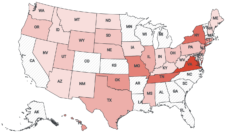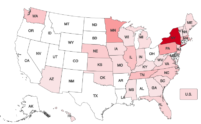 Bills have been introduced in at least 15 states allowing or requiring official notice to be published on various platforms other than local newspapers. That’s significantly more legislative activity focused on replacing newspaper notice than last year and approaches the level of the previous election off-year of 2021.
Bills have been introduced in at least 15 states allowing or requiring official notice to be published on various platforms other than local newspapers. That’s significantly more legislative activity focused on replacing newspaper notice than last year and approaches the level of the previous election off-year of 2021.
Ill-considered Florida bill on the move
 Good news: By March 1, 2021, bills had been introduced in 20 states that would have moved all public notice, or a significant percentage of it, from newspapers to government websites. A year later we’ve seen similar legislation in only six states.
Good news: By March 1, 2021, bills had been introduced in 20 states that would have moved all public notice, or a significant percentage of it, from newspapers to government websites. A year later we’ve seen similar legislation in only six states.
Bad news: The bill in one of those states — Florida House Bill 7049 — is a serious threat to become law. HB-7049 passed out of committee last Monday and is expected to be approved by the full House sometime this week.
So the battle over public notice in Florida comes down to the Senate, as it has in the past.
Which public notice bill will become law in Kentucky?
 It’s been over a month since the Kentucky legislature passed two different, slightly conflicting public notice bills. There has been some confusion about which one will become law when the current statute sunsets on June 30, but that question appears to have been answered last week.
It’s been over a month since the Kentucky legislature passed two different, slightly conflicting public notice bills. There has been some confusion about which one will become law when the current statute sunsets on June 30, but that question appears to have been answered last week.
When we last left the Bluegrass State, HB195 had been vetoed by Gov. Andy Beshear (D) and HB351 had not. The governor later used his line-item veto to strike a number of provisions in HB351, a budget bill, including those relating to public notice. The Republican-dominated legislature ultimately overturned both of Beshear’s vetoes.
New Kentucky public notice law maintains status quo ante
 After following a convoluted path that included two different bills, half a dozen amendments, five floor votes and a grand compromise, the Kentucky legislature passed a bill last week ensuring that the state’s public notice law would remain mostly unchanged.
After following a convoluted path that included two different bills, half a dozen amendments, five floor votes and a grand compromise, the Kentucky legislature passed a bill last week ensuring that the state’s public notice law would remain mostly unchanged.
The original public notice provisions of both HB195 and HB351 would have moved all government notice in the Bluegrass State from newspapers to government websites. Following a compromise earlier this year between the Kentucky Press Association (KPA) and the associations representing cities and counties in the state, HB195 was amended to exclude counties with population under 80,000. That amendment brought it closer to the state’s current law — passed two years ago and due to sunset this summer — which allows counties with population above 90,000 to run notices on their own websites; decreasing the population threshold by 10,000 would have increased the number of website-notice-only counties from eight to ten.
The Kentucky Compromise
 Republican domination of Kentucky’s statehouse has not been a positive development for the Bluegrass State’s public notice laws, which have been under siege for the better part of the last decade. The fight came to a head in 2017, when the GOP assumed majority-party status in both chambers for the first time in the state’s modern history.
Republican domination of Kentucky’s statehouse has not been a positive development for the Bluegrass State’s public notice laws, which have been under siege for the better part of the last decade. The fight came to a head in 2017, when the GOP assumed majority-party status in both chambers for the first time in the state’s modern history.
After failing to move public notice legislation via the normal committee process in 2017, state Senator Chris McDaniel (R-Covington) added language to a budget bill authorizing local governments in counties over 90,000 in population to publish most government notices on their own websites. McDaniel’s amendment also allowed school districts in the state to publish annual financial statements on their websites instead of newspapers. The bill eventually passed both the House and Senate, but former Governor Matt Bevin vetoed it because it raised taxes. His veto was overridden.
‘Enemy of the people’ rhetoric takes toll on public notice in statehouses
 Bills have been introduced in at least seven states so far this year that would move most public notice from its traditional home in newspapers to lightly visited government websites. And at least of few of those bills were introduced by legislators who have had fraught relationships with the newspapers that cover them.
Bills have been introduced in at least seven states so far this year that would move most public notice from its traditional home in newspapers to lightly visited government websites. And at least of few of those bills were introduced by legislators who have had fraught relationships with the newspapers that cover them.
The states that appear at present to face the greatest potential peril — Florida, Kentucky, West Virginia and Missouri — have all been down this path before.
Foreclosure Bill on Move in Missouri; Some Notices Eliminated in Kentucky
 A bill that would allow mortgage trustees in Missouri to publish foreclosure notices on websites rather than newspapers picked up momentum yesterday afternoon when it received a favorable vote in the House Legislative Oversight Committee. The next step is the House floor.
A bill that would allow mortgage trustees in Missouri to publish foreclosure notices on websites rather than newspapers picked up momentum yesterday afternoon when it received a favorable vote in the House Legislative Oversight Committee. The next step is the House floor.
SB 909 is widely believed to be an effort by trustees in this nonjudicial foreclosure state to profit off the notices they are required to publish before auctioning delinquent properties to the highest bidders. Two of the largest trustee law firms in Missouri have been the primary proponents of the legislation.
Missouri Only State in Present Public Notice Peril
 An election year? A surge in passion for government transparency? A growing admiration among state legislators for their local newspapers? Whatever the reason, the state of public notice in the U.S. remains unseasonably calm for this time of the year.
An election year? A surge in passion for government transparency? A growing admiration among state legislators for their local newspapers? Whatever the reason, the state of public notice in the U.S. remains unseasonably calm for this time of the year.
Lots of public notice-related legislation has been introduced — PNRC is tracking more than 200 bills — but so far most of it hasn’t gone anywhere. There have been pockets of activity over the last month, however. Here are the highlights.
Wisconsin, Missouri on High Alert as Public Notice Bills Churn Through State Legislatures
 More than 120 public notice bills have been introduced in at least 37 different states through the first week of March, raising varying levels of concern among newspaper publishers and state press associations around the country. The only states where the danger signs are flashing red, however, appear to be Wisconsin and Missouri.
More than 120 public notice bills have been introduced in at least 37 different states through the first week of March, raising varying levels of concern among newspaper publishers and state press associations around the country. The only states where the danger signs are flashing red, however, appear to be Wisconsin and Missouri.
Kentucky, Wisconsin Conclude Public Notice Reviews on Positive Note
 Committees formed to review public notice laws in two states adjourned last month after showing strong support for maintaining public notices in newspapers. Wisconsin’s Legislative Study Committee on Publication of Government Documents and Legal Notices ended its review on Oct. 10, deciding to recommend only one change to a minor category of notices. Three days later, the Kentucky General Assembly’s Program Review and Investigations Committee ended its 27-month study with no changes.
Committees formed to review public notice laws in two states adjourned last month after showing strong support for maintaining public notices in newspapers. Wisconsin’s Legislative Study Committee on Publication of Government Documents and Legal Notices ended its review on Oct. 10, deciding to recommend only one change to a minor category of notices. Three days later, the Kentucky General Assembly’s Program Review and Investigations Committee ended its 27-month study with no changes.
